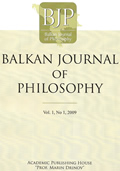Kierkegaard and Rational Justification of Morality -A Critique of Macintyre’s Account
Kierkegaard and Rational Justification of Morality -A Critique of Macintyre’s Account
Author(s): Bojan BlagojevicSubject(s): Philosophy
Published by: Институт по философия и социология при БАН
Keywords: Kierkegaard; the aesthetic; the ethical; despair; self; justification of morality
Summary/Abstract: This essay is the critique of MacIntyre’s thesis that Kierkegaard isn’t trying to justify morality at all. Using MacIntyre’s account of Kierkegaard’s work Either/Or, and comparing his interpretation to Kierkegaard’s works, I aim to show that MacIntyre’s conclusions are wrong. In doing so, I will provide a different interpretation of Either/Or, while arguing that it is possible to use later Kierkegaard’s works in that interpretation. Contrary to MacIntyre’s assertion, Kierkegaard does not change his characterization of the ethical in his later works, but outlines in Either/Or the same problems he will deal with in Fear and Trembling. The foundation of his conception of the ethical lies in his conception of the self, given in The Sickness unto Death. Analyzing this conception of self through Kierkegaard’s account of the forms of despair, I will argue that the significance of morality lies in delivering the self from various forms of despair. As Kierkegaard’s thesis on the ubiquity of despair provides a horizon for the debate between the aesthetic and the ethical individual, we can say that the concept of despair provides a basis for his justification of morality.
Journal: Balkan Journal of Philosophy
- Issue Year: III/2011
- Issue No: 1
- Page Range: 75-80
- Page Count: 6
- Language: English

